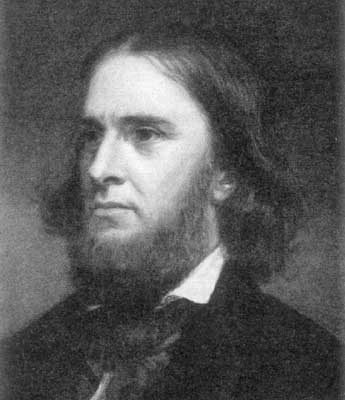<Back to Index>
- Mathematician Benjamin Peirce, 1809
- Bluesman Muddy Waters, 1805
- Naval Marshal General Isoroku Yamamoto, 1884

Benjamin Peirce (April 4, 1809 – October 6, 1880) was an American mathematician who taught at Harvard University for about fifty years. He made contributions to celestial mechanics, statistics, number theory, algebra, and the philosophy of mathematics.
After graduating from Harvard, he remained as a tutor (1829), and was subsequently appointed professor of mathematics in 1831. He added astronomy to
his portfolio in 1842, and remained as Harvard professor until his
death. In addition, he was instrumental in the development of Harvard's
science curriculum, served as the college librarian, and was director of the U.S. Coast Survey from 1867 to 1874. Benjamin Peirce is often regarded as the earliest scientist of the United States, whose research was recognized as world class. In number theory, he proved there is no odd perfect number with fewer than four prime factors. In algebra, he was notable for the study of associative algebras. He first introduced the terms idempotent and nilpotent in 1870 to describe elements of these algebras, and he also introduced the Peirce decomposition. In
the philosophy of mathematics, he became known for the statement that
"Mathematics is the science that draws necessary conclusions". Benjamin Peirce's definition of mathematics was credited by Charles Sanders Peirce as helping to initiate the consequentialist philosophy of pragmatism. Like George Boole, Benjamin Peirce believe that mathematics could be used to study logic. These ideas were developed by Charles Sanders Peirce, who noted that logic also includes the study of faulty reasoning. In contrast, the later logicist program of Gottlob Frege and Bertrand Russell attempted to base mathematics on logic. Benjamin Peirce proposed a Peirce's criterion for the statistical treatment of outliers, that is, of apparently extreme observations. His ideas were developed by Charles Sanders Peirce. Benjamin Peirce was an expert witness in the Howland will forgery trial, where he was assisted by his son Charles Sanders Peirce. Their analysis of the questioned signature showed that it resembled
another particular handwriting example so closely that the chances of
such a match were statistically extremely remote. As a person he was devoutly Christian, seeing "mathematics as study of God's work by God's creatures." He married Sarah Hunt Mills, the daughter of U.S. Senator Elijah Hunt Mills. The husband and wife had a daughter and three sons: Charles Sanders Peirce a famous logician, James Mils Peirce, who also taught mathematics at Harvard, and Herbert Henry Davis Peirce, who worked for Herter Brothers.